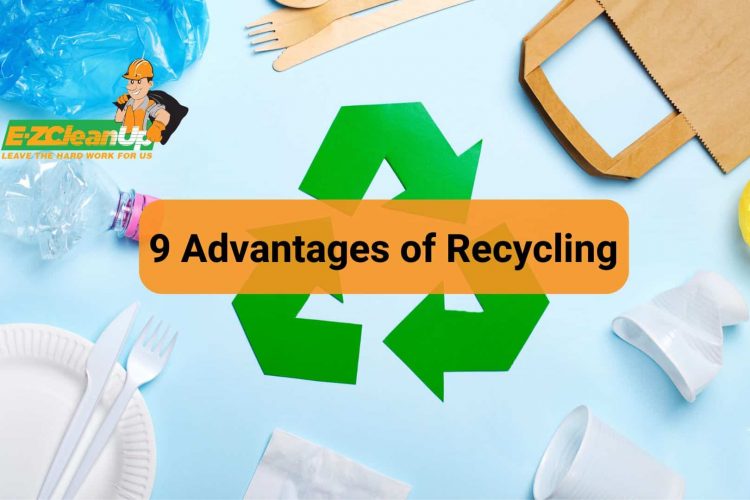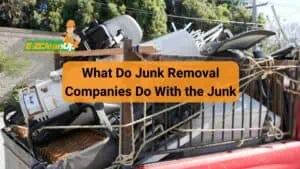Recycling conserves resources, reduces energy use, and cuts greenhouse gas emissions. It lowers production costs, boosts economic security with local jobs, and reduces import dependency. Recycling also promotes community engagement and environmental awareness.
Learn more about the 9 advantages of recycling in our guide below.
#1: Saving Natural Resources through Recycling
Recycling helps us reuse materials that have already been processed, such as paper and wood. It leads to a reduction in the need to harvest new raw materials. By focusing on recycling, we avoid the extensive deforestation required to meet the growing demand for these materials.

Impact of Recycling on Resource Conservation
Recycling one ton of paper can save around 17 trees and also cut down on water and energy consumption. This is significant because the process of creating products from recycled materials generally uses far less energy compared to producing them from new resources.
For example, making aluminum from recycled materials consumes 95% less energy than if starting from scratch. This conservation effort also means less mining and extraction. This helps protect ecosystems and maintain biodiversity.
Promoting Sustainability
Adopting recycling habits encourages us to reduce waste and reconsider how we use resources. It fosters a more responsible approach to consumption.
By recycling, we prevent materials from becoming waste while contributing to the long-term conservation of our planet’s resources. This is to make sure they remain available in the future.
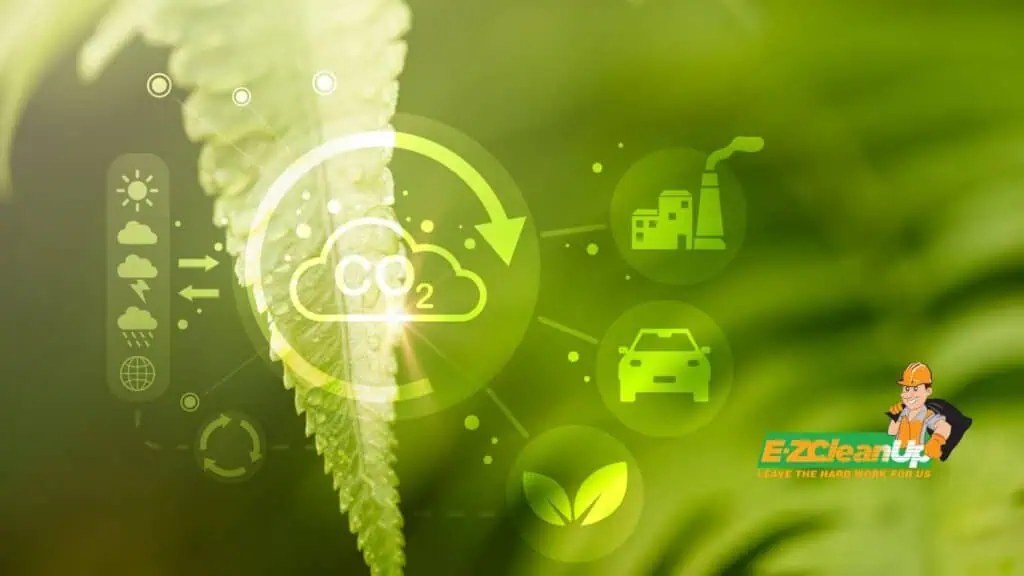
#2: Reducing Pollution through Recycling
Recycling is crucial to lessening pollution because it cuts down on the need to produce materials from scratch, which often involves heavy emissions. Industrial activities emit harmful pollutants like sulfur dioxide and nitrogen oxides, which contribute to smog and acid rain. By recycling, we reduce these emissions and lessen both air and water pollution.
Saving Energy and Resources
Recycling uses much less energy compared to making products from new materials. For example, using recycled aluminum saves about 95% of the energy needed to produce new aluminum.
This significant energy saving leads to fewer greenhouse gas emissions, which helps reduce our overall carbon footprint. Recycling materials like paper and plastics also conserves energy, further reducing air pollution.
Decreasing Industrial Water Pollution
Recycling reduces water pollution by lowering the demand for water in industrial processes and decreasing the release of contaminants into water bodies. This helps preserve aquatic life and maintains water quality for other uses.
Improving Soil Quality and Cutting Down on Landfill Waste
By diverting waste from landfills, recycling helps to limit soil contamination. Materials in landfills can release toxic substances, but recycling reduces the amount of waste and minimizes these risks.
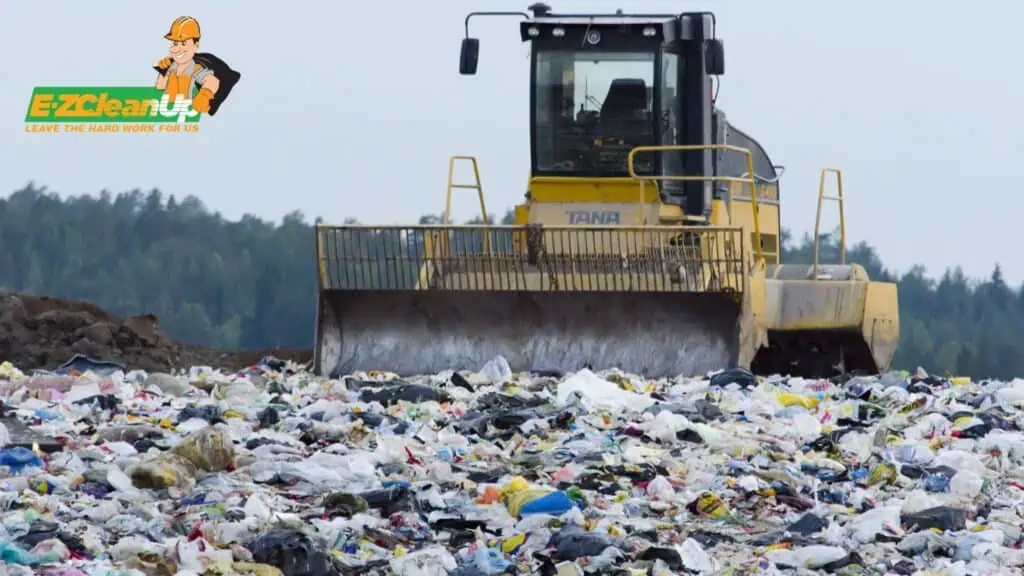
#3: Cutting Down on Landfill Waste
Landfills occupy valuable land and can leak toxins into the soil and groundwater. By keeping waste out of landfills, recycling protects soil quality and prevents water contamination.
Saving Resources and Energy
Using fewer landfills also saves natural resources and energy. Managing landfills requires a lot of land and energy. By recycling, we decrease the need for these large, resource-intensive waste management processes and repurpose materials that would otherwise add to landfill volume.
Boosting Public Health and Environmental Quality
Less landfill waste means lower emissions of methane, a powerful greenhouse gas that is released as organic waste breaks down in landfills. By diverting organic waste to recycling and composting, we cut down on methane emissions.
This helps combat global warming. Reducing landfill use also helps prevent the spread of landfill gases that can worsen air quality and pose health risks to communities.
#4: Boosting Energy Efficiency with Recycling
Maximizing Energy Savings in Metal Recycling
Recycling metals, especially aluminum, is highly energy-efficient. For example, recycling aluminum consumes about 95% less energy than producing it from raw bauxite ore. Just recycling one aluminum can save enough energy to run a television for three hours.
Energy Conservation through Paper Recycling
One ton of recycled paper can save 4,100 kilowatt-hours of energy—enough to power an average American home for six months and save 7,000 gallons of water. Using recycled paper reduces the demand for virgin pulp, which in turn cuts down on deforestation and the energy involved in the logging, transportation, and processing of new wood.
Reducing Energy Use by Recycling Plastics
Producing products from recycled plastics uses much less energy than starting from scratch with virgin materials. Recycling plastic reduces the needed energy by two-thirds. This demonstrates the efficiency of recycling compared to new production processes.
Overall Environmental Gains
Embracing recycling practices reduces greenhouse gas emissions, decreases the extraction of finite resources, and cuts down on industrial pollution. As communities and industries prioritize recycling, the collective impact greatly enhances sustainability and conserves energy across various sectors.

#5: Economic Upsides of Recycling
Recycling cuts down on production expenses because using recycled materials is generally cheaper than processing new resources. This cost savings can lead to lower product prices for consumers. It promotes both affordability and eco-friendly practices.
Moreover, by incorporating recycled materials, businesses engage in a sustainable cycle that boosts the economy. This includes job creation in the recycling industry, advancements in recycling technology, and increased tax revenue from these operations.
Companies often receive financial benefits, like tax breaks, for using recycled materials. This supports both economic and environmental health.
#6: Boosting Economic Security with Local Resources
Using local resources instead of imported materials strengthens economic security. Reducing dependence on foreign raw materials, like rare earth elements, helps the U.S. avoid risks from global political tensions and supply chain issues.
This strategy supports the national economy, boosts local industries, and creates jobs. Less reliance on foreign materials protects the U.S. economy from global disruptions. By increasing domestic production and recycling, the U.S. reduces its exposure to international market shifts and gains economic independence.

#7: Expanding Jobs in Recycling
Recycling does more than protect the environment—it boosts the economy significantly. In the U.S., the recycling sector supports over 757,000 jobs and brings substantial economic advantages.
It generates $36.6 billion in wages and $6.7 billion in tax revenues annually. This shows the strong economic influence of recycling per ton of material processed.
Supporting Local Economies through Recycling
Positions in local recycling centers, municipal services, and recovery facilities help keep economic benefits within the community.
This sector also helps the U.S. economy by cutting down on the need for imported materials, which are often impacted by global political and supply issues.

#8: Building Community Through Recycling
Community cleanup and recycling programs help build a sense of responsibility and awareness about the environment. By getting residents involved in sustainable practices, these programs strengthen community ties and motivate everyone to help protect their environment.
This involvement teaches people about the effects of their habits on the world and encourages a united effort towards sustainability.
Recycling programs also act as educational tools that boost understanding of sustainability’s benefits. They teach the community, especially young people, about conserving resources and the environmental consequences of waste.
#9: Cutting Carbon Emissions Through Recycling
Recycling greatly lowers the energy needed to create new products, which directly reduces greenhouse gas emissions. Energy conservation is vital for fighting climate change and shrinking our ecological footprint.
By making recycling a regular part of life and business, we significantly cut down on energy use and greenhouse gas emissions. This helps global efforts to protect the environment and combat climate change. This proactive stance not only conserves resources but also ensures a healthier
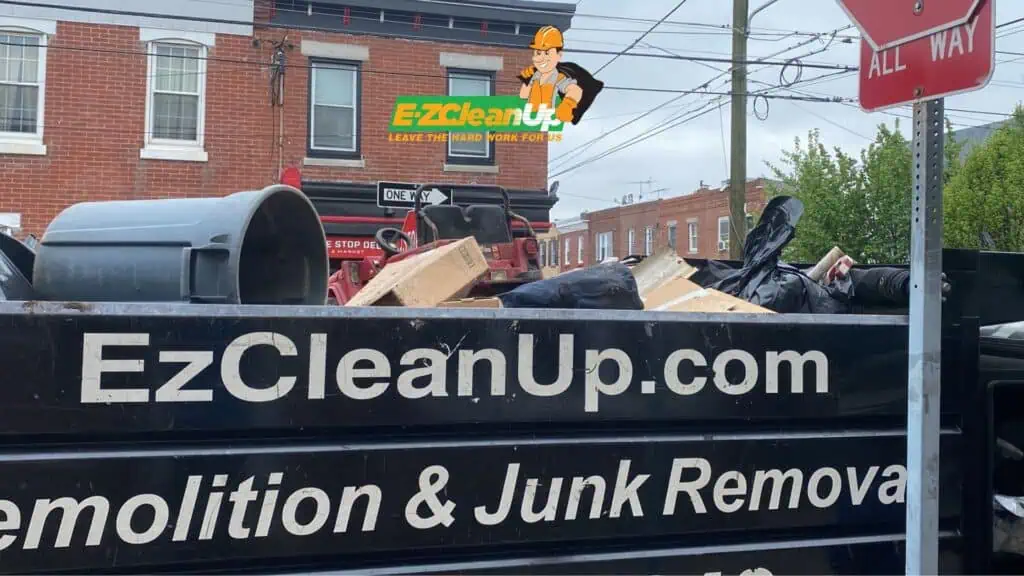
Recycle with Ease
Understanding the 9 advantages of recycling reveals how this practice is crucial for sustainability. To effectively manage the debris and recycled materials in your vicinity, EZ CleanUp provides professional junk removal and site cleanup services.
Our team is equipped to handle everything from small-scale residential projects to large commercial demolitions. Enhance your recycling initiatives by partnering with us. Call us to book our services.

